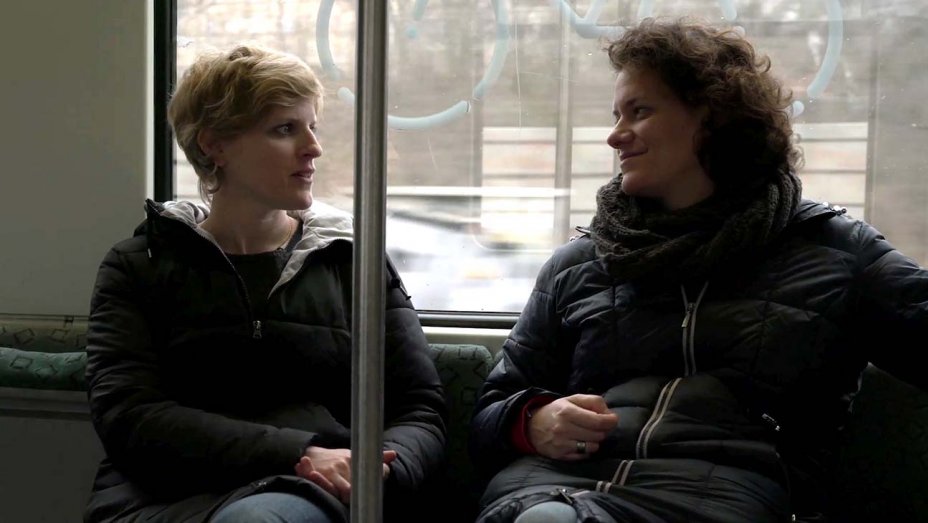BACK TO THE FATHERLAND
First Run Features
Reviewed for Shockya.com & BigAppleReviews.net linked from Rotten Tomatoes by: Harvey Karten
Director: Kat Rohrer, Gil Levanon
Cast: Gil Levanon, Katharina Maschek, Dan Peled, Gidi Peled, Lea Ron Peled, Uri Ben Rehav, Kat Rohrer, Guy Shahar, Yochanan Tenzer
Screened at: Critics’ link, NYC, 6/8/19
Opens: June 14, 2019
Hitler promised that Europe would be free of Jews, and in 1945 the only Jews remaining in Germany were those who somehow avoided being gassed, shot, worked to death, or were fortunate enough to remain in hiding or passing for Christian. You would think that after the most infamous genocide in history, the last people to actually pick up and return to Germany or to Austria—which largely welcomed Nazi rule and murdered tens of thousands—would be Jews. Even more ironic, Israel was created to provide a safe homeland for the Jewish people, and even some people born in the “land” would move to central Europe. How is this possible? Not only are they leaving relative safety and comfort in Israel and in the diaspora: they are bonding with a country that not only has a grim 20th century history, but one today which displays a rising renewal of antisemitism. Kat Rohrer and Gil Levanon’s documentary, “Back to the Fatherland,” narrows the statistics down to a handful of characters, focusing on three families with individuals who made a “reverse Aliyah, leaving Israel for Germany and Austria.
What affords the movie a special niche in dramas bearing the Holocaust theme is not only the seeming absurdity of this plunge back into the darkness of history, but also because grandparents of the individuals were aghast at the decision of the young people, one saying “no way.” The young people determined to live in Germany and Austria are burdened with guilt for going against the wishes of their grandparents. (This reminds me of my childhood when all my friends were Jewish, most of whom attending synagogue on the high holy days of Rosh Hashanah and Yom Kipper though they were secular. “I did this for my grandmother,” one admitted, “I want to continue to have good relations with all my family.”)
You might say that “Back to the Fatherland” is told from a female point of view, directed by two women involved in the subject; Gil Levanon is a blond-haired Israeli whose grandfather survived the Holocaust, and Kat Rohrer, who met Levanon while students at NYU, with a grandfather who was a Nazi officer and whose uniform has been kept in an attic for some seventy years.
In the documentary’s opening lines, the theme is set: Gil Levanon (keep in mind that she is the blond director, important because the story can get mighty confusing since three families’ lives are juxtaposed) tells Yochanan, her grandfather, that she intends to leave Israel for Germany. What could have sent the elderly man into cardiac arrest results only in shock, disbelief, and dismay. About the Germans, he states, “They were bad, they stayed bad, and they will always be bad.”
The three cinematographers cut to Dan, born in Israel but living in Berlin, where he intends to stay rather than return to Israel. He is obviously to the left politically, having abandoned “the land” because of the government’s treatment of Palestinians, which he—like President Jimmy Carter—considers an apartheid state. To add to his idealistic politics, he has taken a German wife, pregnant, and set to give birth by the conclusion of the picture. Like Levanon, he also has a grandparent, Austria-born grandma Lea, an Israeli citizen. And like Yochanan, she is disappointed by her grandson’s warm feelings toward Vienna.
To add to the movie’s confusion, Guy Shahar cuts into the pot pourri, a man with his own philosophy toward Israel and Austria. He lives with an Austrian girlfriend and is not too thrilled with his environment. Stating that if things got too hot in Central Europe, he will move back to Israel. Guy has a grandparent, Uri Ben Rehav, who does not oppose Guy’s decision to remain in Austria. Still, he has never forgotten that during the thirties in Germany he was arrested by the Gestapo for wearing his country’s colors. (Bizarre: first the Nazis say that Jews are not loyal to Germany; then they protest when a Jew proudly wears the colors of the flag. In another movie some time back, a Nazi spots a Jewish person with a book and wonders: “How dare a Jew read Goethe?”)
This is a film that would be ever so much better if the directors isolated each of the three stories, bringing everyone together at the end. What is otherwise an enlightening and entertaining picture explaining some reason that Jews and Israelis live in the countries that wanted them annihilated, the back-and-forth editing leads to perplexity.
77 minutes. © 2019 by Harvey Karten, Member, New York Film Critics Online
Story – B
Acting – B
Technical – B
Overall – B







